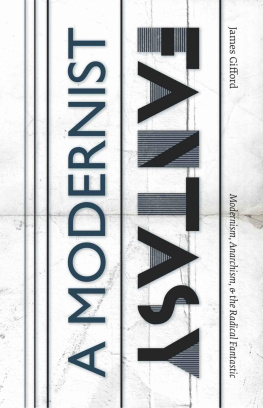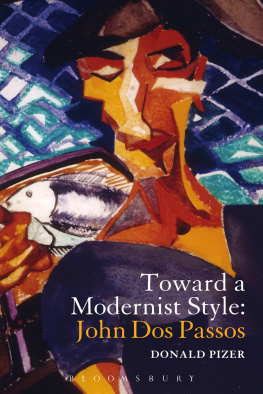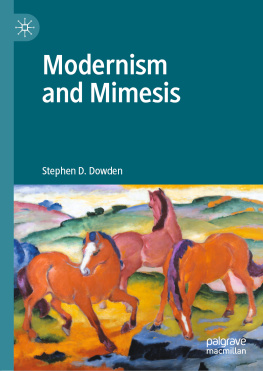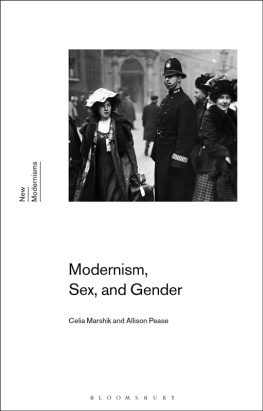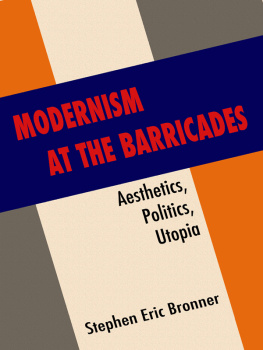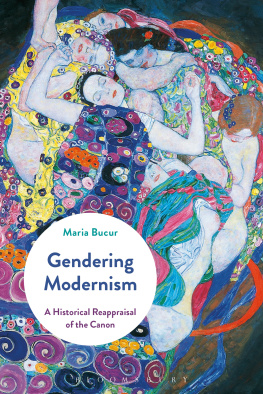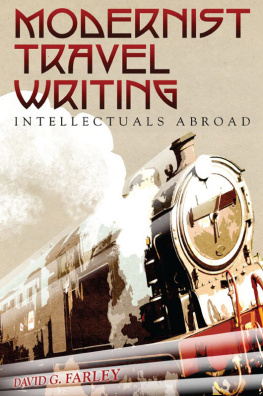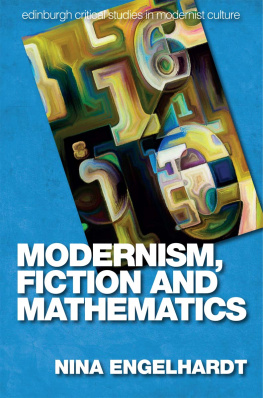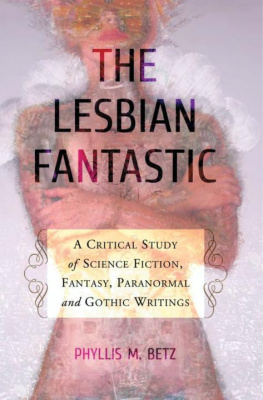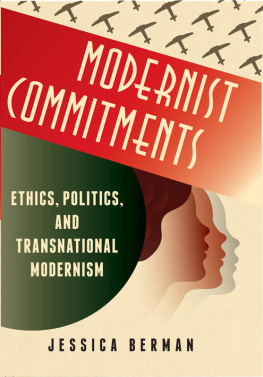A modernist fantasy : modernism, anarchism, & the radical fantastic / James Gifford.
(ELS monograph series ; no. 111)
Issued in print and electronic formats.
ISBN 978-1-55058-393-9 (softcover).--ISBN 978-1-55058-628-2 (Kindle)
1. Fantasy fiction, English--History and criticism. 2. English fiction--19th century--History and criticism. 3. English fiction--20th century--History and criticism. 4. Modernism (Literature)--Great Britain--History and criticism. 5. Anarchism in literature. 6. Radicalism in literature.
I. Title. II. Series: ELS monograph series ; no. 111
Acknowledgements
I never expected to write this book, so I am thankful to all readers who helped me to keep working at it and believing it was worthwhile. When I first began looking to fantasy authors in an anarchist tradition from the poets Id studied in Personal Modernisms , I very hesitantly shared draft ideas in a seminar for the Modernist Studies Association in Pittsburgh in 2014. The participants gave me much needed encouragement, especially Nicole Peeler and my co-organizer James Clawson. I didnt know if this would work, and the responses of everyone in that seminar made me realize this was worth attempting. Thanks to Stephen Ross for admitting hed read the Elfstones as a kid in the Fraser Valley too My blind readers for Place, Personalism, Anarchism, & Fantasy: Recasting Late Modernism in Literature Compass gave much to consider and helpful challenges as I planned this project, especially where we disagreed. Luke Carson at ELS Editions and all readers (blind and otherwise) helped me enormously to sharpen the polemic and limit some of my bugbears here. Many thanks to all of you for taking time out of demanding professional schedules to read and comment. I deeply appreciate the kind gift of your time as readers and hope this work repays at least some of my intellectual debt to you all.
I especially want to thank my neighbour Julie for passing a copy of Pamela Deans The Secret Country over the fence in July 1985 and her grandmother for having a stash of Piers Anthonys Xanth novels. They led me to the three Modrybedd of the Village Bookshop in Aldergrove who smoked and drank coffee all day while selling kids the books that our parents probably wouldnt approve of. Rather than the Hardy Boys, I had Garion and Ged, and it made a difference. Great thanks also to my Aunt Molly and Uncle Huey who gave me David Eddingss Belgariad that same summer to read and reread without ever asking for it back.
I owe much to Gay Walker at the Reed College Librarys Special Collections, and just as much to the dozen used bookstores of the Pacific Northwest that helped me to find the things libraries dont keep. To my students at Fairleigh Dickinson University who were willing to take Popular Fiction, Dissent in Popular Culture, and Cultural Studies courses and to read across Le Guin, Butler, Miville, Howard, and Delany, I learned as much preparing for those classes as I did from your generous engagement and questions. Special appreciation also goes to Peter Midgley at the University of Alberta Press for several insightful discussions about this project and others.
Finally, for Lindsay thank-you for giving me the support and space to write this book. For Finlay and Riordan, I hope that some small part of this project leads to many books passed over the fence to you, books that might be a portal opening your own summer adventures and imaginations to whatever you will.
Hobgoblin Modernism: A Preface
It all started in another book A prequel. After I completed a complicated archival project retracing the global correspondence networks of late modernist radical anarchist poetry groups in World War II, I found several poets had turned to popular pulp. It was a time of need in the post-war years, and poetry never pays its bills. So, after Id picked up its tab and archival traces in Personal Modernisms , I wanted my own turn to pulp for a much needed break. I wanted simplicity. I wanted recreation. I wanted to read their enervating adventures written in simple words. But it wasnt simple. It was just as radical. It was as predisposed to anarchist concerns as ever. It was just as complicated. Like in real life, I ditched the relaxation of a readers equivalent of an all-inclusive vacation and turned to the stimulation of the archive, and the resort gave way to research. It was all wrong for the deep rest I deserved. I realized that if I wanted a real break from serious reading, I needed to go further into fantasy pulp and away from the literary types who were earning a living when their radical poetics didnt pay the bills.
Thats how I eventually found myself in the basement of the Reed College Librarys Special Collections in Portland it was even a road trip: a journey, a quest. A Reedie, David Eddings, later became one of the bestselling fantasy authors of the twentieth century, and after giving my little sister a set of his books just as I was given them when they first came out, Id become curious. So when I sat there with Eddingss papers in hand, ostensibly as part of a trip meant to research the Beats, I discovered the impossible. Hed been a tenured professor of English literature before quitting the profession. Worse still, hed taught modernism! And I was holding his detailed lecture notes on modernist English and American literature. When his quest narrative gave cheeky dialogue conflicting free choice and determinism by asking why two and two make four, was he really thinking of Dostoyevskys arguments around determinism in Notes From the Underground (Eddings, Magicians 99; Dostoyevsky 337)? Well, he had lecture notes on it
Inconceivable! Political radicals and a modernist legacy amidst fantasys pseudo-medievalisms and reactionary nostalgia? Futurism would appear to be shaking hands with the anti-modern. This book, A Modernist Fantasy , is the unexpected conceiving of those three things together as an intertwined set: modernism, anarchism, and fantasy fiction taken from the 1890s until the moment when the mainstream intruded around 1978 and a change of consciousness began. Eddings came later, but he was too much a part of what started me on this journey to not be here at the end of all things.
More was at work than this curiosity of finding my childhood authorial fandom transformed. I felt there was a lesson to be learned. If modernist concerns had infiltrated Eddingss fantasy novels, he was surely not alone in this my cast of radical poets included several who turned to the genre after World War II, so it was to be expected of them, but what of those who were only ever in the mainstream? For Eddings, there were the pop cultural analyses of his works that tended strongly toward the dismissive. Farah Mendlesohn presents Eddingss conclusion to the Mallorean series as a damp squib, as the choice was unbelievably obvious (Crowning 161), yet with his lecture notes in mind, the inevitability is, quite literally, no different from the freedom to believe that 2 and 2 is four as in George Orwells Nineteen Eighty-four , which is not bad company. Its also entirely the point the choosing individual in conflict with determinism. Both Orwell and Eddings, in fact, gestured back to the same modernist source in Dostoyevsky, itself already a double gesture backward to Nikolai Chernyshevskys What Is to Be Done? . Would such assumptions follow for other earlier voices of the genre as well? In the same frame of reference, Eddings gave a prose style with what many described as minimal world building without the grit of real life. He set the rumours in motion in interviews by saying the commercial success of Tolkiens Lord of the Rings inspired his turn to the genre (Nicholls, Ring 78). His teaching notes and personal diaries revealed something very different: a world as elaborate as Tolkiens and that he wrote entirely prior to the narrative that became The Belgariad, but for Eddings it was expunged from the final product. The archives also revealed a real life with more grit than most of us could bear, and once seen, impossible to overlook in the so very clean novels. And lastly, Tolkien was included much earlier in Eddingss teaching materials as a striking contrast to British Literature materials on modernism in his classes (beside Pound, Eliot, and Joyce). So much for the story of commercial opportunism Tolkien was already there long before the widely-circulated story (and story is right) of Eddings finding Lord of the Rings in a bookshop in its 73rd printing and hence a commercial model for success (Nicholls, Ring 78). Even the distracting story of leaving his vaguely described (implicitly sessional or adjunct) teaching post in protest against administrative fiscal greed (Nicholls, Ring 77) is belied by his notes on his checklist prior to moving from Dakota back to Washington. The most important phrase in his to do list for the move is a question: whether or not to sue for alienation of marital affections. The goody-goody troubled marriages in his fiction, in this context, suddenly become impossible to ignore, even if the narrative voice never dwells on it in a way that alienates the young or fun reader. In other words, like virtually all modernist authors I know, his public statements were storytelling and heavily fictionalized at that to disguise deep-set intellectual and emotional concerns that, in retrospect, appear blindingly obvious in the otherwise (contrary to modernist authors) superficially uncomplicated prose style. Its a plainness that Hemingway shows took great effort.

